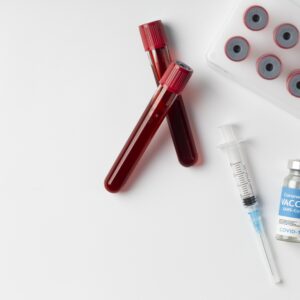Beta-Human Chorionic Gonadotropin (β-hCG) is a hormone produced by the placenta during pregnancy. The β-hCG test measures the level of this hormone in the blood or urine and is primarily used for pregnancy confirmation, monitoring pregnancy health, and diagnosing certain medical conditions.
Why is the β-hCG Test Done?
The β-hCG test is used to:
- Confirm pregnancy – Detects pregnancy as early as 10 days after conception.
- Monitor pregnancy health – Helps assess conditions like ectopic pregnancy or potential miscarriage.
- Screen for fetal abnormalities – Part of prenatal screening for conditions such as Down syndrome.
- Diagnose certain cancers – Used as a tumor marker for testicular, ovarian, or trophoblastic cancers.
Types of β-hCG Tests
- Qualitative β-hCG Test – Detects if hCG is present (positive or negative for pregnancy).
- Quantitative β-hCG Test – Measures the exact level of hCG in the blood to monitor pregnancy progression or detect medical conditions.
Test Procedure and Preparation
- Blood test: A sample is drawn from a vein in the arm.
- Urine test: Typically done using an early morning sample for better accuracy.
- No fasting is required, but informing the doctor about medications is recommended.
 Beta-Human Chorionic Gonadotropin (β-hCG) Test
Beta-Human Chorionic Gonadotropin (β-hCG) Test Beta-Human Chorionic Gonadotropin (β-hCG) Test
Beta-Human Chorionic Gonadotropin (β-hCG) Test